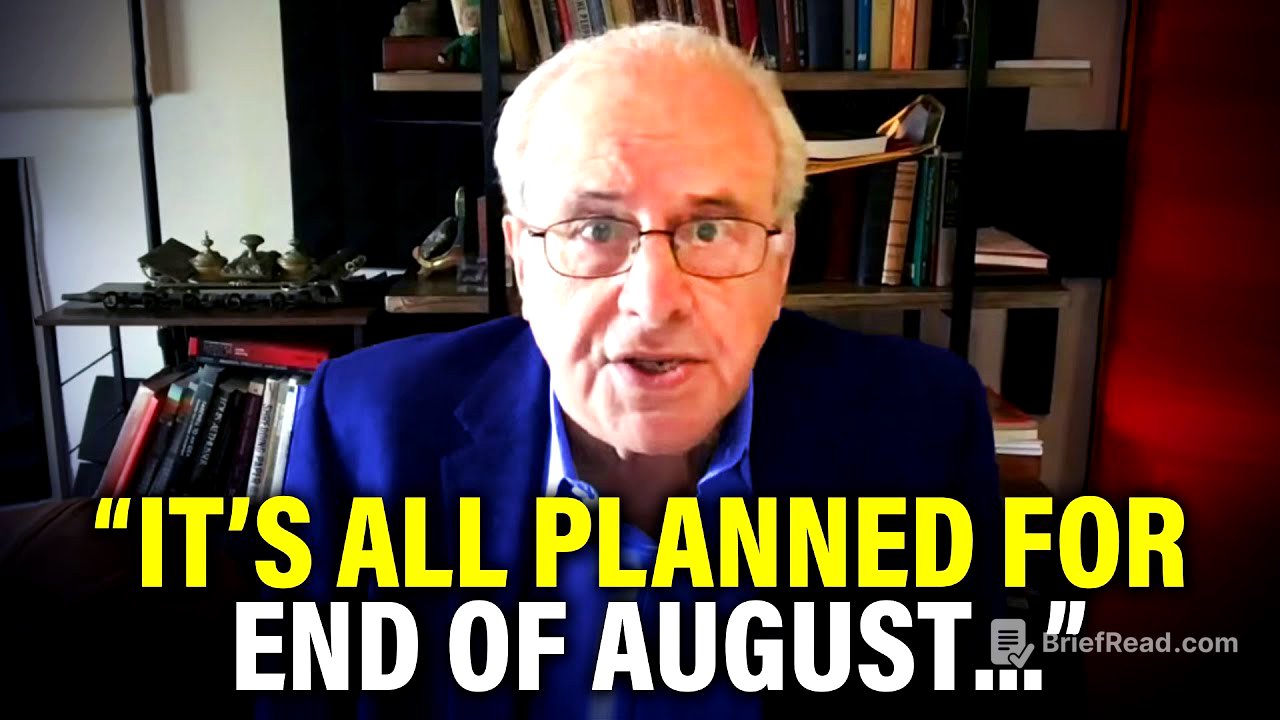TLDR;
The video discusses the decline of the American empire, drawing parallels with historical examples and highlighting current economic and political challenges. It emphasizes the shift in global power towards China and the BRICS nations, the unsustainability of current U.S. economic policies, and the potential for social and economic upheaval. The video concludes by urging viewers to recognize their own power to influence the future and advocate for change.
- The United States is in a period of decline, marked by lost wars and economic shifts.
- Global power is shifting towards China and the BRICS nations.
- The American working class is being squeezed through various mechanisms like inflation and regressive policies.
- The denial of these realities by political leaders exacerbates the problems.
- The American people have the potential to influence the future and advocate for change.
Introduction: The Decline of the American Empire [0:00]
The speaker asserts that the United States is in a period of decline, a concept unfamiliar to many Americans due to the country's history of ascent. This decline is not openly acknowledged by leaders, causing a significant split in the country. The speaker aims to provide an honest assessment of the situation, even if it is upsetting or contradicts prevailing narratives.
Evidence of Decline: Lost Wars and Global Shifts [1:05]
The speaker cites several examples to illustrate the decline, including the U.S.'s losses in Vietnam, Afghanistan, and Iraq, and its current struggles in Ukraine. Indonesia's recent decision to join the BRICS alliance (Brazil, Russia, India, China, and South Africa) is presented as a significant shift in global power. The BRICS nations, now comprising about 22 countries, represent 55-60% of the world's population and approximately 36% of global output, surpassing the G7 nations (United States, Japan, Canada, Britain, France, Italy, and Spain), which account for about 28%. This shift indicates a move in global wealth and influence towards the East, particularly China.
Denial and Make-Believe: The American Response [6:01]
The speaker criticizes the American tendency to deny or ignore these shifts, using the example of Indonesia joining BRICS, which received little to no attention in mainstream U.S. media. The dominance of Chinese high-tech firms and the rejection of collaboration offers from China and Russia are also cited as examples of this denial. The speaker also points out the irrationality of the electric car trend, which was driven by profit motives rather than a genuine effort to create a rational mass transit system.
The Case of BYD: A Missed Opportunity [9:07]
The speaker highlights the success of the Chinese company BYD in producing high-quality, low-cost electric vehicles, which have gained popularity worldwide except in the U.S. This is attributed to a 100% tariff on Chinese electric vehicles, implemented to protect domestic manufacturers like Ford and General Motors. The speaker argues that this tariff harms American producers by forcing them to buy more expensive, less competitive vehicles, ultimately undermining their ability to compete globally and leading to job losses.
Debt and Zombie Corporations: The Economic Reality [13:57]
The speaker discusses the high levels of household, corporate, and government debt in the U.S., noting the existence of "zombie corporations" that rely on taking on more debt to pay off existing debt. The speaker points out that the two biggest creditors of the U.S. government are Japan and China, with China holding approximately $850 billion in U.S. debt. This means that a portion of American taxes is used to pay interest to China, indirectly funding their military capacity.
The Squeeze on the Working Class: Inflation and Other Tactics [18:24]
The speaker explains how empires in decline tend to offload their burdens onto the working class. This is achieved through various means, including suppressing unions and creating inflation. The speaker argues that inflation is not a mysterious phenomenon but a deliberate decision by employers to raise prices and reduce the value of workers' wages. The speaker criticizes the Federal Reserve's response to inflation, which involves raising interest rates, a measure that disproportionately harms the working class.
Historical Examples: Wage-Price Freeze and Wartime Controls [25:02]
The speaker provides historical examples of alternative approaches to managing economic crises. During the inflation crisis of the late 1970s, President Richard Nixon implemented a wage-price freeze, which effectively stopped inflation overnight. During World War II, the U.S. government, influenced by economists with socialist leanings, implemented price controls and rationing to prevent shortages and ensure fair distribution of goods.
Trump, Ukraine and the Future [29:47]
The speaker notes that Donald Trump's appeal stemmed from his recognition of the economic pressures faced by the American people. The speaker criticizes the U.S.'s approach to the conflict in Ukraine, arguing that the country's nuclear weapons are useless and its conventional warfare capabilities are insufficient. The speaker also points out the failure of economic sanctions against Russia, which were circumvented by the BRICS nations. The speaker suggests that Trump's policies, such as mass deportations and tariffs on Mexican goods, could lead to a disaster in Mexico.
Conclusion: The Power of the People [39:51]
The speaker concludes by emphasizing that the future depends on the actions of the rest of the world and the American people themselves. The speaker suggests that the American people have the power to resist being exploited during the decline of the empire. The speaker points to the resurgence of the labor movement and the growing awareness of economic inequality as signs of hope. The speaker encourages viewers to recognize their own strength and advocate for change, noting that the old Cold War mentality is fading, and young people are more open to alternative ideas.









